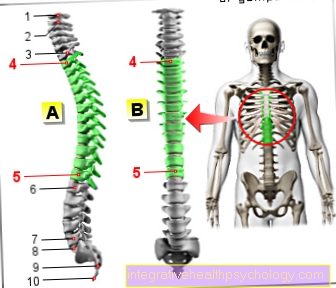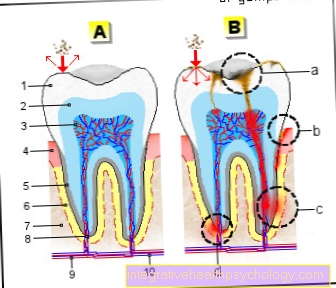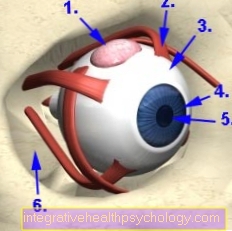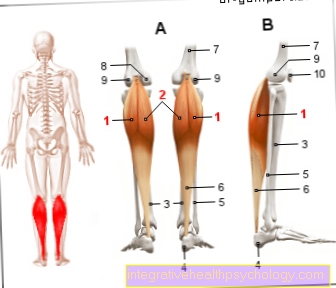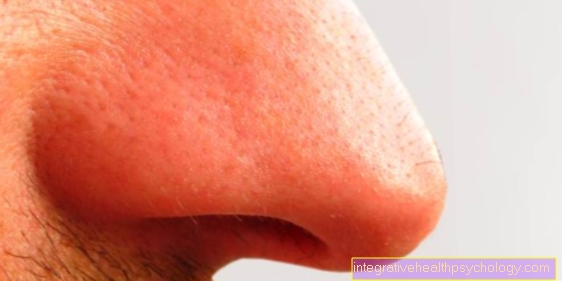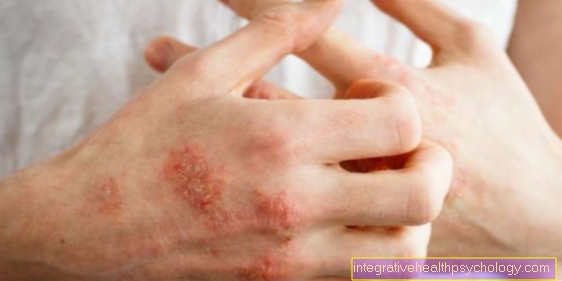Oxytocin deficiency
definition
The body's own messenger substance oxytocin, often also known as the "cuddle hormone", is released during orgasm as well as at birth and causes the uterine muscles and vagina to contract involuntarily. The hormone got its name from this birth-facilitating function: The term oxytocin comes from the Greek and means: "easy birth".
When breastfeeding, it is responsible for the release of breast milk by contracting the muscle cells of the mammary gland. Oxytocin also promotes interpersonal and emotional bonds between mother and child or sexual partners.

A deficiency in this hormone means that there is either relatively or absolutely too little oxytocin to cause these bonding effects. The oxytocin deficiency as such is a rather unexplored area, as are the consequences of such deficiency. According to the current state of knowledge, it can be assumed that an oxytocin deficiency can be partly responsible for various psychological or mental illnesses or at least can be associated with some.
Symptoms
Oxytocin deficiency is most seriously noticeable in women during childbirth, since a sufficient oxytocin level is essential for the sufficiently good muscle tension in the uterus. An oxytocin deficiency can therefore cause so-called uterine atony, i.e. a loss of tension in the uterine muscles, during birth. This leads to serious bleeding, which can be life-threatening for the mother.
Read more on this topic at: Childbirth complications
In addition, a low oxytocin level can probably make itself felt in a person's ability to bond: In animal experiments, monogamous animals showed consistently higher oxytocin levels than animals that often change their sexual partner. It is assumed that this phenomenon can also be transferred to humans. So people who have problems with lasting bonds or even simple human relationships may have lower oxytocin levels.
It is now even assumed that there is a connection between an oxytocin deficiency and mental illnesses such as anxiety disorders. There is also likely to be a correlation with autism. Whether a deficiency in oxytocin is actually the cause or even the effect of mental illness has not yet been clarified.
Oxitocin deficiency at birth
A low oxytocin deficiency at birth means that the muscles of the uterus do not contract sufficiently. This can lead to serious bleeding during and after the birth. To prevent this, the mother is routinely given intravenous oxytocin via an infusion in obstetrics in the hospital. More recent findings also suggest a connection between oxytocin deficiency and what is known as "postpartum depression".
The administration of an oxytocin-containing nasal spray as a new therapy option could significantly reduce the incidence of such depression in some studies. However, this type of therapy for postpartum depression is still very new and it will take some time before it is used regularly.
Oxytocin deficiency while breastfeeding
When breastfeeding, oxytocin causes the muscle cells in the mammary gland to contract, which forces breast milk out of the gland. Oxytocin is released by the infant by sucking on the nipple. An oxytocin deficiency leads to a reduced ability of the mammary gland cells to contract and thus to a more difficult delivery of breast milk to the infant. As a consequence, the mammary gland may not be emptied completely and the chest may become tense and painful.
Read more about this under Painful breastfeeding.
Oxytocin is also released in the infant's body during breastfeeding, but a corresponding deficiency is not known at this point. This can have an impact on the bond between mother and child.
You can find more on the topic at: Breastfeeding and breastfeeding problems
causes
The causes of an oxytocin deficiency have not yet been fully clarified. It is believed that it is most likely due to insufficient production in the hypothalamus, part of the cerebrum, or an inadequate release from the pituitary gland. These two theories are more likely than a defect in the oxytocin receptors.
It is believed that the deficiency is due to genetic factors. This would also explain the familial accumulation of certain mental illnesses which, according to the current state of knowledge, are associated with a low level of oxytocin in the blood.
Can you fix oxytocin deficiency?
To remedy an oxytocin deficiency, the substance is supplied to the body from the outside. In clinical obstetrics, this is done by giving an intravenous infusion to prevent insufficient tension in the uterus. If the uterus does not contract enough during or shortly after delivery, it can cause significant bleeding. This phenomenon is still the leading cause of maternal mortality worldwide.
For more information, see: Childbirth complications
Furthermore, the use of a supportive administration of oxytocin, for example in the form of nasal sprays, is discussed as a therapeutic approach for psychological and mental predispositions such as anxiety disorders, social phobia and autism.
Also read: Oxytocin nasal spray
diagnosis
To measure a person's oxytocin level, it is usually done by testing the blood plasma. Although the result only reflects a snapshot, with several values a certain tendency towards a higher or lower oxytocin level can be deduced. Up to now, however, such a measurement has only been carried out in the context of corresponding studies; the oxytocin deficiency is not a diagnosis in terms of an actual disease. This is mainly due to the fact that this phenomenon with its causes and effects is still relatively new and unexplored.
Consequences of oxytocin deficiency in men
Oxytocin deficiency can also be noticeable in men: On the one hand, as in women, there may be a lack of attachment or empathy, but on the other hand problems with ejaculation are also possible. Here oxytocin promotes the expulsion of semen, especially the components of the sperm and prostate secretion. In extreme cases, this can result in a lower sperm concentration in the ejaculate.
Further information on the subject of oxytocin deficiency
For more information on the subject of "Oxytocin Deficiency", see
- Oxytocin
- Woman's hormones
- Breastfeeding
- Problems in breastfeeding
- Painful breastfeeding
- Postpartum depression
You can find an overview of all topics in anatomy under Anatomy A-Z.


-braun.jpg)
.jpg)





